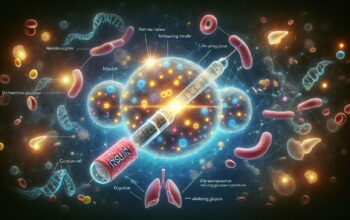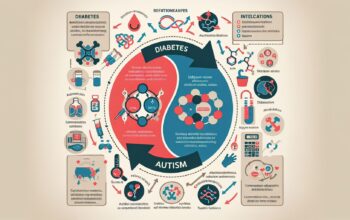Among the countless health conditions that afflicts millions of individuals worldwide, diabetes and autism are two that remain a challenge due to their complexity and the diverse impact they have on those affected. Both conditions are individual in their presence, but what happens when they occur together in one person? Can a link between diabetes and autism exist? Let’s take a closer look and explore this complex interaction.
Understanding Autism
Autism, or autism spectrum disorder (ASD), is a condition that affects one’s brain development. ASD is marked by a spectrum of symptoms – varying from mild to severe – such as difficulties in social interaction, communication challenges, and repetitive behaviors. Current statistics reveal that around 1 in 54 children in the United States are diagnosed with ASD, indicative of its widespread prevalence.
The Intricacies of Diabetes
Diabetes, a chronic disease that affects how your body processes glucose, also plays a significant role on a global scale. More than 422 million people worldwide suffer from diabetes, with Type 1 and Type 2 as the most common types. Type 1 diabetes is an autoimmune condition where the pancreas does not produce insulin. Type 2 diabetes, on the other hand, occurs when the body either becomes resistant to insulin or doesn’t produce enough.
Could There be a Link?
Research is increasingly suggesting a possible association between these two conditions. Several studies have explored the possibility of a shared genetic pathway between autism and Type 1 diabetes, implying a potential biological causality. A massive cohort study conducted in Denmark found that children with Type 1 diabetes had a higher prevalence of autism than those without diabetes.
Similarly, a study published in the Journal of Autism and Developmental Disorders suggested a higher rate of ASD in children of mothers with gestational diabetes compared to those without. However, it is crucial to reiterate that correlation does not imply causation. The link between the two is still under investigation, and many factors could contribute to these connections.
The Challenges of Dual Diagnosis
Dealing with the challenges that come with a dual diagnosis of autism and diabetes can be quite an endeavor. Individuals with autism often have difficulty responding to physical discomfort, further complicating diabetes management, which involves constant monitoring of blood glucose levels.
Moreover, some individuals with autism strictly prefer certain foods, making it challenging to stick to a diabetes-friendly diet plan. Additionally, ASD’s characteristic social and communication difficulties could prove to be barriers in seeking healthcare assistance and adherence to medication regimens.
Managing Diabetes in Individuals with Autism
Educating family members and caregivers is paramount in effectively managing diabetes in individuals with ASD, as they need to understand both conditions’ nuances. Customizing the approach to suit the individual’s unique tendencies and comfort levels is critical.
For instance, the repetitive behaviors often seen in autism can actually be utilized advantageously in establishing a routine for testing blood glucose levels and taking medications. Similarly, integrating diabetes-friendly foods into their preferred diet may require some creativity and experimentation.
Regarding medical care, it might be beneficial to seek professionals experienced in caring for patients with both conditions. They can provide comprehensive care plans and consider all factors influencing an individual’s health.
The Road Ahead
While the connection between autism and diabetes continues to be a subject of ongoing research, one aspect remains clear: we must prioritize offering tailored, compassionate, and accessible healthcare to those with these conditions. This includes focusing on robust diagnosis methods, comprehensive treatment strategies, and various support systems. Even in the backdrop of complexity and challenge, every individual deserves to live the highest quality of life possible. And with the right care and support, this can become a reality for those navigating the intersection of diabetes and autism.




